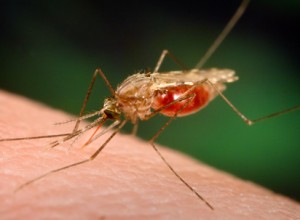Nobel prize-winning drug Ivermectin showing promise to fight malaria transmission
 The American Society of Tropical Medicine and Hygiene (ASTMH) says Ivermectin, the drug that earned its developers a Nobel prize for treating multiple tropical diseases is showing promise as a tool for interrupting malaria transmission.
The American Society of Tropical Medicine and Hygiene (ASTMH) says Ivermectin, the drug that earned its developers a Nobel prize for treating multiple tropical diseases is showing promise as a tool for interrupting malaria transmission.
New findings from a trial in Burkina Faso, presented by researchers from Colorado State University and the Institut de Recherche en Sciences de la Santé at ASTMH’s annual meeting, show an approximate 16 percent reduction in childhood malaria, in four villages where majority of the population has been receiving a single dose of Ivermectin every three weeks.
The ASTMH says the malaria is the type caused by the parasite Plasmodium falciparum and the villages are located in an area that experiences a high burden of both malaria and worm diseases, offering the opportunity to address multiple health problems at the same time.
The Burkina Faso trials are said to exclude children less than 90 centimeters (three feet tall), pregnant and newly breast-feeding women.
“These are preliminary results but we expect to see further reductions in malaria fevers as we continue with the trial, which is occurring during the rainy season when malaria transmission typically peaks,” said Brian D. Foy, the lead investigator on the project.
Meanwhile, the society says that at its annual meeting, the US Walter Reed Army Institute of Research (WRAIR) and its US component at the Armed Forces Research Institute of Medical Sciences in Thailand also presented data showing that Ivermectin can block development of Plasmodium vivax parasites in mosquitoes that are common in Southeast Asia.
The American Society of Tropical Medicine and Hygiene however says that the drop in malaria within the villages is however not exclusive to Ivermectin treatment but is being achieved alongside insecticide-treated bed nets, which are the ASTMH says are in widespread use in all of the villages under study.
The Society said in a statement that Ivermectin is not intended to cure malaria but rather interrupt transmission as laboratory studies had shown that mosquitoes die or are weakened when they feed on the blood of people who have taken Ivermectin.
The researchers plan to get majority of people in a town or village to take the drug and pass it to mosquitoes that bite them.
“Even if the mosquitoes don’t get enough Ivermectin to directly kill them, we think a sub-lethal dose should be sufficiently toxic to reduce malaria transmission,” Brian Foy said.
According to the ASTMH, over the last three decades more than one billion doses of Ivermectin have been distributed in Africa and Latin America in campaigns that have reduced the burden of lymphatic filariasis, which causes elephantiasis, and onchocerciasis (river blindness).
The Nobel Prize in Physiology or Medicine was earlier in October 2015, awarded to developers of Ivermectin, William C. Campbell of Drew University and Satoshi Ōmura of Japan’s Kitasato University.
By Emmanuel Odonkor
